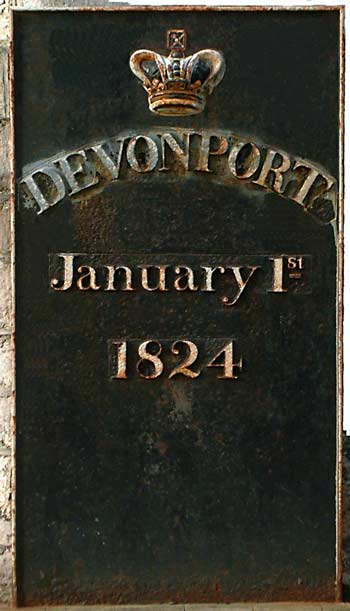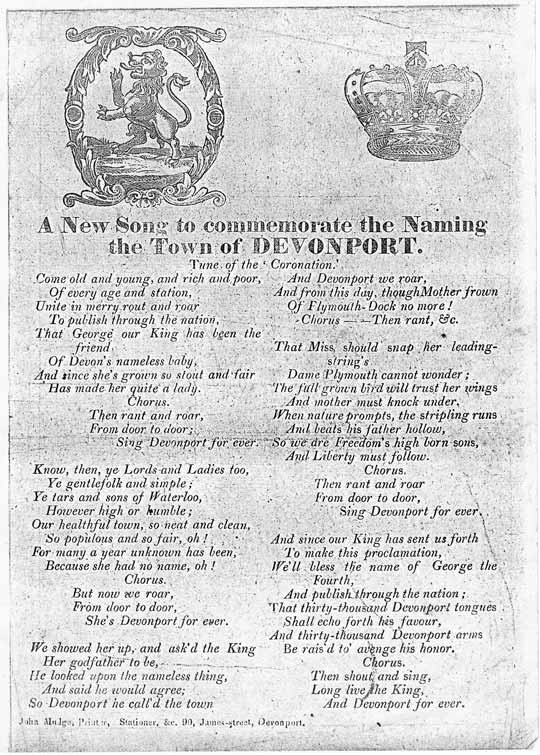Devonport, by Royal Decree - 1824
Following construction of the dockyard on the shores of Stoke Damerel in the 1690s,
this area was often mistakenly, though not officially, called Plymouth-Dock, after her neighbour the nearby town
of Plymouth. With growth of
the town that subsequently grew around the dockyard,
there was never any legal Act, nor official document, specifiying that Stoke Damerel
henceforth contain the word Plymouth in its name, yet for over 100 years it was
consistently referred to as
Plymouth-Dock - even by the Admiralty. Although, sometimes
the Admiralty did distinguish the two separate towns on its paperwork,
initially referring to 'Dock in Hamoaze', but even that wasn't the correct name
for the area that is now known as Devonport.
The one legal place where the name Stoke Damerel was documented, thus it
should have been used from the start, was The Domesday
Book. Again, the Admiralty did sometimes get it right, as some of their paperwork
was
addressed to 'The Dock at Stoke Damerel' but there was no consistency. Over the
years both the Admiralty and others drifted into using the name of nearby Plymouth,
and referring to this area as Plymouth-Dock.
From the 1690s the parish of Stoke Damerel grew rapidly, and within 100 years became
one of England's most important towns. The dockyard, the cause of the growth, was
lauded in both naval and parliamentary circles; some naval superiors thought it
the best dockyard in Britain. The town eventually became the biggest west of Bristol,
outgrowing
her two nearest neighbours, Plymouth and Stonehouse.
Residents were proud of coming from such an area and by the early 1800s, their resentment
of being mistaken for and lumped together with Plymouth - well documented in local
history books - came to a head. They petitioned the king for a change of name, that
the parish of Stoke Damerel no longer be associated with the name Plymouth.
The king accepted the plea and named the town Devonport, being the port of
Devon. A proclamation was issued, that the new name was to legally take effect from
1st January 1824. A town plaque was raised to commemorate the event, medals were
struck and joyful parties and processions were held in the town. It
was and remains an important event in Devonport's history. The town plaque
is shown in the image below.

Devonport's town plaque has not been looked after; it is rusted, needs paint,
and has occasionally suffered from graffiti splashed across it. This plaque is located
in the lane between the Guildhall and Devonport Column, at the top of Ker Street.
Devonport Forever! (1824)
A song called
Devonport Forever was written to celebrate the town's new name.
The song was performed in a pageant through the streets on New Years Day, 1824, the procession ending
at the Guildhall. The music was the tune called
Coronation. The words of
Devonport Forever are as follows:
Come old and young, and rich and poor,
Of every age and station,
Unite in merry rout and roar
To publish through the nation,
That George our King has been the friend
Of Devon’s nameless baby,
And since she’s grown so stout and fair
Has made her quite a lady.
Chorus:
Then rant and roar
From door to door
Sing Devonport forever.
Know then ye lords and Ladies too,
Ye gentlefolk and simple;
Ye tars and sons of Waterloo,
However high or humble;
Our healthful town so neat and clean,
So populous and so fair, oh!
For many a year unknown has been,
Because she had no name oh!
Then rant and roar
From door to door
Sing Devonport forever.
We showed her up, and asked the King
Her godfather to be,
He looked upon the nameless thing,
And said he would agree;
So Devonport he called the town
And Devonport we roar,
And from this day, though mother frown
Of Plymouth-Dock no more!
Then rant and roar
From door to door
Sing Devonport forever.
That Miss should snap her leading-strings
Dame Plymouth cannot wonder;
The full grown bird will trust her wings
And mother must knock under,
When nature prompts, the stripling runs
and beats his father hollow,
So we are Freedom's high born sons,
And Liberty must follow.
Then rant and roar
From door to door
Sing Devonport forever.
And since our King has sent us forth
To make this proclamation,
We’ll bless the name of George the Fourth,
And publish through the nation;
That thirty-thousand Devonport Tongues
Shall echo forth his favour,
And thirty-thousand Devonport arms
Be rais'd to avenge his honour.
Then shout and sing,
Long live the King,
And Devonport forever.

The image above shows a leaflet I was lucky enough to purchase from eBay - it contains the words of the song and was published by
John Mudge, Printer, Stationer, etc., 90 James Street, Devonport.
The music for Coronation was written by Oliver Holden and published in Holden's
Union Harmony in 1793. The publishers say it is "a vigorous marching tune
with many repeated tones... requires the jubilant repetition of the last couplet
of text for each stanza... and is to be sung in parts and accompanied with a firm sense
of rhythm".
see www.hymnary.org/tune/coronation_holden#instances
The original text for
Coronation was the hymn
All Hail the Power of Jesus'
name.
More information is available from http://www.hymnary.org/tune/coronation_holden ,
and the sheet music, Coronation, is available from http://www.hymnary.org/media/fetch/143017
This music score is in the public domain via the courtesy of Hymnary.org
(page updated
June 2012, Dec 2014 and Jan 2015)